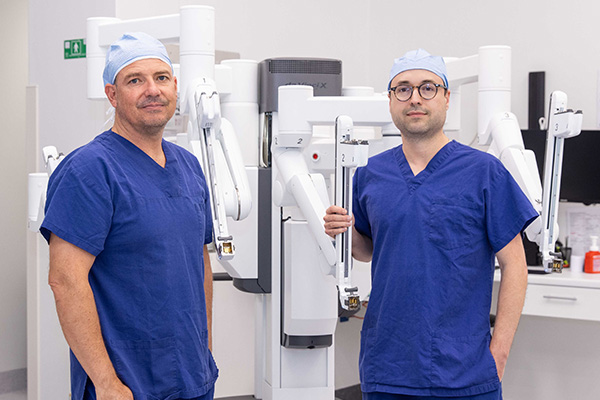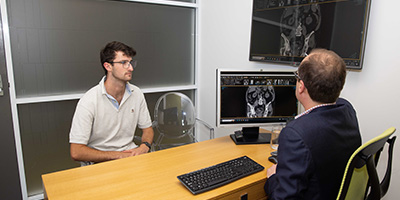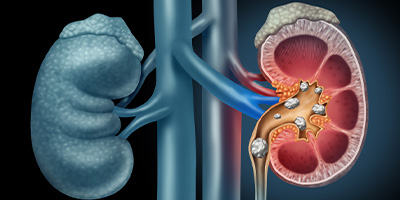Ureteroscopy – Kidney Stones
About The Procedure
Kidney stones are a very common condition that may affect up to 30% of the population.
The term “kidney stones” is a loose term that means stones (calculi) in the urinary tract.
Stones are formed inside the kidney and can stay quiet in there or can also drop into the ureter (which is the pipe that brings the urine from the kidney to your bladder).
Stones in the kidney don’t usually cause pain, however, when it comes down the ureter, it creates a degree of obstruction to the urine and that can be extremely painful. That’s what we call renal colic. Kidney or ureteric stones often require treatment.
If you have had stones in the past, the likelihood of having it again in 5 years is 30% and 50% in 10 years. Places with hot weather have a higher prevalence of kidney stones.
Both Flavio and Wikus are highly competent to perform a ureteroscopy. They have both operated on so many stone cases in the past and still operate on many cases in the public sector, which is why they are considered high-volume surgeons.
Ureteroscopy + laser lithotripsy is the medical term utilised for minimally invasive stone surgery, where they navigate small cameras through the natural pipes and blast the stone with a laser. Stones can be inside the kidney or in the ureters. The ureters are narrow tubes that transfer urine from the kidneys to your bladder.
Very often, during these procedures, a stent (also called a double J catheter) will likely be inserted. It will help to avoid any blockages in the pipe from after-surgery swelling or even residual stones. 95% of patients tolerate the stent well, but unfortunately, there is a small group in which they can have stent-related pain. Our team will help identify if you need any special follow-up regarding your stent.

Operation
Our anaesthetist will discuss with you the need to have either a general anaesthetic or a spinal block. You will also receive the necessary information about fasting before the operation.
The operation will happen in the operation theatre, and we normally use X-ray and video cameras throughout the procedure. That will help us localise and treat your stone according to your needs.
Post Surgery
After surgery, patients usually spend some time in the recovery room. Nurses will make sure you are well awake before transferring you to your comfortable ward bed.
On the wards, you will receive all the help you need from nurses and also all the necessary medication to prevent pain and make yourself comfortable. Sometimes patients can be discharged on the same day, but if necessary or if the patients feel unsafe, they can sleep one night.
It is completely normal to have blood in the urine after the operation. Little by little, urine will get clear. It is important to say that some patients will remain with a small degree of blood in the urine while they still have the stent. We will discuss with you how is the best way to remove the stent. It normally stays in place for some days or weeks.
Both Wikus and Flavio will review you before discharge. All the necessary information will be re-stressed. Pain medication will also be prescribed. Antibiotics sometimes are necessary.
Adequate fluid intake is really important. It will flush the urine and help to clear old blood from the procedure.
At home, the presence of blood in your urine and the discomfort whilst urinating should naturally resolve within a few days. If you do develop worsening pain or fever (temperature above 37.8) you should go to an emergency department and contact our team.
In New Zealand and Tauranga, there are no private emergency departments. If needed you should go to Tauranga Public Hospital A&E. Luckily, both Dr Flavio and Dr Wikus also work in the public sector and are very often on call. However, if we are not in, the Urology team will be able to assist you. That is a plus when deciding which surgeon you should operate with.
For more information about your procedure please read through the information from The British Association of Urological Surgeons (BAUS).
Additional Resources
Ureteroscopy (Telescopic Surgery) For Stone Removal
Information about your procedure from The British Association of Urological Surgeons (BAUS)
Ureteroscopy Process
What's on this page
Other Services






